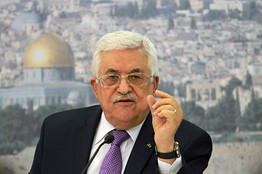 Peace in Palestine: Dismantle the security barrier in the West Bank. Let most Palestinians who live there govern themselves. By Naftali Bennett/WSJ
Peace in Palestine: Dismantle the security barrier in the West Bank. Let most Palestinians who live there govern themselves. By Naftali Bennett/WSJ
Peace in Palestine
On May 14 U.S. Secretary of State John Kerry met with Palestinian Authority President Mahmoud Abbas in London to discuss the “unity government” that Mr. Abbas announced unexpectedly last month. Mr. Abbas’s decision to establish a national government in coalition with Hamas is the latest example in a long line of Palestinian intransigence.
Hamas is a terrorist organization dedicated to Israel’s destruction. The group has killed hundreds of Israelis in suicide bombings and missile attacks. That is the organization’s very mission: The Hamas charter calls for perpetual jihad against the Jewish State while forever rejecting peace negotiations or compromise. Israel will not negotiate with a Palestinian government that includes Hamas.
So how should Israel respond to Mr. Abbas’s announced plan for such a government? I propose what I call the Stability Plan, which I will promote throughout Israel’s new Knesset legislative session.
Palestinians living in certain portions of the West Bank (known as Area A and Area B) should govern themselves. They should hold their own elections, run their own schools, issue their own building permits and manage their own health-care system. In short, they should run their own lives. Israel should not interfere in day-to-day governance.
To achieve this, Israel must allow Palestinians complete freedom of movement, which requires removing all roadblocks and checkpoints in the West Bank. In particular, Israel should dismantle the security barrier erected throughout the last decade to defend against Palestinian terror attacks during the Second Intifada.
Many Israelis credit the barrier with the dramatic increase in security over the past decade. Not a single Israeli was killed by terror in the West Bank in 2012, making it the first year without bloodshed since 1973. Yet this was not solely due to the barrier. The remarkable drop in terror happened thanks to high-quality intelligence coupled with Israel’s ability to conduct targeted military operations in the West Bank. The number of Israeli operations in the West Bank has dropped significantly because the military now only carries out pinpointed operations based on reliable intelligence.
Israel can now stay reasonably secure without the barrier. This will prove especially true if the Israeli government works with the international community to promote Palestinian economic development in Areas A and B. There’s no perfect solution to the conflict, and the wait for one has allowed the Palestinian economy to languish. The hope of independence and statehood has delayed crucial economic investments.
So, during the past few months, Israel’s Ministry of Economy, which I lead, has reviewed different options for helping the Palestinian economy grow. We have looked at the export and import systems, work permits, the climate for international investment and more.
One promising idea is to encourage multinational corporations to invest in Palestinian areas by offering economic incentives such as insurance guarantees and tax breaks. There are also ways to streamline the export process for Palestinian manufacturers so products can reach their destination quickly and in perfect condition. Israel has become known as the “Startup Nation,” but now it is time to build a “Startup Region.”
The other part of the Stability Plan deals with the remaining portion of the West Bank, known as Area C, where 400,000 Israelis and 70,000 Palestinians live. Under my plan, Israel would annex this territory, much as it exercised sovereignty over East Jerusalem in 1967 and the Golan Heights in 1981. The Palestinians who live in Area C would be offered full Israeli citizenship.
East Jerusalem and the Golan Heights still aren’t recognized by the international community as part of Israel. But it is impossible to imagine a state of Israel without the Western Wall. Israel could not withdraw from the Golan Heights while the Syrian civil war rages nearby. East Jerusalem and the Golan are Israeli territory, and the same should be true of Area C.
Annexing Area C would limit conflict by reducing the size of the territory in dispute, which would make it easier to one day reach a long-term peace agreement. Annexation would also allow Israel to secure vital interests: providing security for Jerusalem and the Gush Dan region along Israel’s central coast, protecting Israeli communities within Area C, and applying Israeli sovereignty over national heritage sites such as the Cave of the Patriarchs in Hebron, the burial place of Abraham, Isaac and Jacob.
This arrangement might not be the utopian peace Yitzhak Rabin and Yasser Arafat imagined when they shook hands in the White House Rose Garden in 1993. But it offers Palestinians independent government and prosperity, while ensuring Israeli security and stability. That would improve lives and foster a much healthier coexistence, major progress for a region that has known conflict for decades.
Mr. Bennett is Israel’s minister of economy and leader of the Jewish Home Party.
Peace in Palestine
Share this:
- Share on X (Opens in new window) X
- Share on Facebook (Opens in new window) Facebook
- Share on WhatsApp (Opens in new window) WhatsApp
- Share on Reddit (Opens in new window) Reddit
- Share on LinkedIn (Opens in new window) LinkedIn
- Share on Pinterest (Opens in new window) Pinterest
- Share on Telegram (Opens in new window) Telegram
- Share on Tumblr (Opens in new window) Tumblr
- Print (Opens in new window) Print
Related








